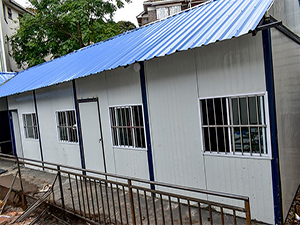
Kileleshwa 5 Classes Project
At Shadel Montessori in Kileleshwa, the classrooms are designed with energy efficiency and comfort in mind, utilizing EPS (Expanded Polystyrene) panels and specialized roofing insulation.
EPS Panels in Construction of Shadel Montessori Classes in Kileleshwa
Introduction
In the modern era of sustainable building practices, Shadel Montessori in Kileleshwa has taken a significant step by incorporating EPS panels in the construction of its classrooms. Expanded Polystyrene (EPS) panels are not only a testament to innovative architectural techniques but also a commitment to creating an optimal learning environment for students. This article explores the multifaceted benefits of using EPS panels in the construction of Shadel Montessori classrooms in Kileleshwa, emphasizing energy efficiency, structural integrity, and environmental sustainability.
What are EPS Panels?
EPS panels, or Expanded Polystyrene panels, are lightweight, rigid, and highly versatile building materials made from expanded polystyrene foam. These panels are known for their excellent thermal insulation properties, making them an ideal choice for various construction applications. EPS panels are manufactured by expanding polystyrene beads and molding them into panels of varying thickness and densities, which can then be used for walls, roofs, and other structural components.
Advantages of EPS Panels in Construction
1. Thermal Insulation
One of the primary benefits of using EPS panels in the construction of Shadel Montessori classrooms is their exceptional thermal insulation. EPS panels significantly reduce the transfer of heat, maintaining a consistent indoor temperature. This results in a comfortable learning environment, regardless of external weather conditions. The superior insulation properties also contribute to energy efficiency by reducing the need for artificial heating and cooling.
2. Lightweight and Durable
EPS panels are remarkably lightweight yet incredibly durable. This dual advantage simplifies the construction process, reducing the need for heavy machinery and extensive labor. The lightweight nature of EPS panels also means that the overall structural load on the building is minimized, enhancing the safety and longevity of the classrooms.
3. Environmentally Friendly
The use of EPS panels aligns with Shadel Montessori’s commitment to environmental sustainability. EPS panels are made from a material that is 98% air and only 2% polystyrene, which means they require less raw material to produce. Additionally, EPS panels can be recycled, further minimizing their environmental impact.
4. Cost-Effective
EPS panels offer a cost-effective solution for construction. Their lightweight nature reduces transportation and handling costs, while their ease of installation shortens construction timelines. This efficiency translates into lower overall construction costs, making it a financially viable option for educational institutions like Shadel Montessori.
5. Structural Integrity
Despite their lightweight composition, EPS panels provide robust structural integrity. They are resistant to moisture, mold, and pests, ensuring a long-lasting and healthy classroom environment. The panels also offer excellent load-bearing capabilities, making them suitable for both walls and roofing applications.
Application of EPS Panels in Shadel Montessori Classrooms
Wall Construction
In the construction of Shadel Montessori classrooms, EPS panels are used extensively for wall construction. The panels are prefabricated and can be quickly assembled on-site, significantly reducing construction time. The walls constructed with EPS panels provide superior thermal insulation, ensuring that classrooms remain comfortable throughout the year.
Roofing Insulation
The specialized roofing insulation at Shadel Montessori also utilizes EPS panels. The panels’ thermal properties are particularly beneficial in roofing applications, where they help to reduce heat transfer from the roof to the interior spaces. This not only improves energy efficiency but also enhances the overall comfort of the classrooms.
Sound Insulation
In addition to thermal insulation, EPS panels also offer sound insulation properties. This is crucial in an educational setting where a quiet and peaceful environment is necessary for effective learning. The use of EPS panels in walls and ceilings helps to dampen external noise, creating a serene atmosphere conducive to education.
Energy Efficiency and Cost Savings
The integration of EPS panels in the construction of Shadel Montessori classrooms has led to significant energy savings. The excellent thermal insulation properties of EPS panels reduce the reliance on heating and cooling systems, leading to lower energy consumption. This not only benefits the environment by reducing the carbon footprint but also results in substantial cost savings on energy bills for the institution.
Commitment to Sustainable Building Practices
Shadel Montessori’s adoption of EPS panels is a reflection of its commitment to sustainable building practices. By choosing environmentally friendly materials and energy-efficient construction techniques, the institution is setting a benchmark for other educational facilities. The use of EPS panels is just one example of how Shadel Montessori is dedicated to creating a sustainable future for its students and the broader community.
Conclusion
The innovative use of EPS panels in the construction of Shadel Montessori classrooms in Kileleshwa highlights the numerous benefits of this advanced building material. From superior thermal and sound insulation to environmental sustainability and cost-effectiveness, EPS panels offer a comprehensive solution for modern construction needs. Shadel Montessori’s commitment to using EPS panels not only enhances the learning environment for students but also sets a standard for sustainable building practices in educational institutions. As more schools and institutions recognize the advantages of EPS panels, we can expect to see a broader adoption of this technology in the construction industry.

